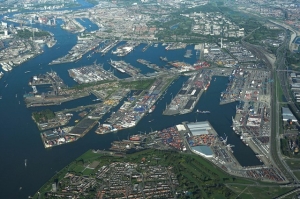


(Posted on 28/04/23)
In the first quarter of 2023, 1.5% less freight passed through the port of Rotterdam than in the same period last year. In total, 111.7 million tonnes were handled compared with 113.4 million tonnes in the same period in 2022. The fall mainly concerned the throughput of containers and freight in the breakbulk segment (Roll-on/Roll-off and other general cargo). Throughput in the mineral oil products, crude oil, LNG, iron ore & scrap, agribulk and coal segments increased.
Allard Castelein, CEO of the Port of Rotterdam Authority: ‘As expected, the year 2023 started with a slight decline in throughput. Especially in the container segment, we faced a decline in volumes due to high inflation and a weakening economy. Results in the other segments mainly show growth and confirm that dependence on Russian energy flows has been further reduced in line with the sanctions. For the remainder of the year, we expect a limited decline in throughput volumes due to the uncertainties posed by the current geopolitical situation and high inflation.’
The dry bulk segment showed a slight growth of 0.2% to 17.9 million tonnes in the first quarter. In this segment, iron ore & scrap and coal are the main commodities. Both commodities showed an increase. Throughput of iron ore & scrap rose by 10.1% to 6.2 million tonnes. As a result of the temporary failure of blast furnaces in Dunkirk, Gijón and IJmuiden, factories in Rotterdam’s hinterland operated more intensively. This was also the cause for the increased demand for cokes for steel production. In the first quarter, the total coal throughput increased by 26.3% to 7.4 million tonnes.
In the first quarter, liquid bulk throughput increased by 5.6% to 54.3 million tonnes. Within this market segment, the supply of crude oil increased by 0.8 million tonnes (+3.2% to 26.3 million tonnes). As a replacement for Russian oil, more crude oil was supplied from the United States, West Africa and the Middle East. Since this oil is transported over longer distances, the use of Very Large Crude Carriers (VLCCs) increased. In the first quarter, twice as many VLCCs (50) have already unloaded crude oil as last year. Port calls from Suezmax tankers also increased by 30%. Transhipment of mineral oil products increased by 1.6 million tonnes to 15.1 million tonnes (12%) in the first quarter. This increase was mainly due to the increase in the throughput of diesel at independent terminals and at the dolphins. This served mainly to replace imports of sanctioned Russian diesel. The throughput of LNG also increased by 14.3% to 3 million tonnes in the first quarter. This was due to the high European gas price and the fact that more spot cargo has been shipped. The growth in LNG supply comes mainly from the United States as an alternative to reduced European imports of Russian gas by pipeline.
Container throughput decreased 11.5% by weight to 31.5 million tonnes and 11.6% by volume to 3.2 million TEU (the standard unit for containers). This decline had already started during 2022 due to the elimination of volumes to and from Russia. As the war in Ukraine only began in late February, the impact on throughput volumes in the first quarter of last year was still limited. In the past, these volumes accounted for 8% of total container throughput. The decline in imports from Asia (-14.2% in TEUs) due to lower demand for physical goods due to accumulated stocks and inflation was also reflected in the throughput figures. Despite the strong improvement in chain performance, no transhipment has been recovered yet in the first quarter. These volumes moved to smaller ports due to congestion during the pandemic.
The total throughput in the breakbulk segment (Roll-on/Roll-off and other general cargo) decreased by 6.0% to 7.9 million tonnes. RoRo traffic decreased by 2.2% to 6.6 million tonnes compared with the first quarter of last year. This was due to lower demand from the UK due to a moderately performing economy. Throughput of other general cargo fell by 20.9% to 1.4 tonnes
The European Investment Bank (EIB) has signed an €80 million loan with the Port Authority of Bilbao... Read more
Mukran Port on the island of Rügen, Germany, has gained a strategically important partner for the... Read more
Abu Dhabi based AD Ports Group a leading enabler of global trade, logistics, and industry, has announced... Read more
Leading Vietnamese maritime-logistics operator Haivanship (HVS) is growing its Konecranes fleet with... Read more
Euroports Group is set to strengthen its bulk handling capacity at North Sea Port (Ghent) with the addition... Read more
Damen Shipyards Group has delivered six RSD Tugs 2513 to the Port of Antwerp-Bruges in Belgium. The... Read more
Throughput of bulk cargo at the Port of Hamburg has experienced a slight recovery over the course of... Read more
The Lobito Atlantic Railway (LAR) has taken an important step this week towards strengthening its transport... Read more
The Port of Hull recently welcomed two new eco-friendly vessels built for charterer Ahlmark Lines AB... Read more
The U.S. Environmental Protection Agency (EPA), in a historic move toward green infrastructure, has... Read more